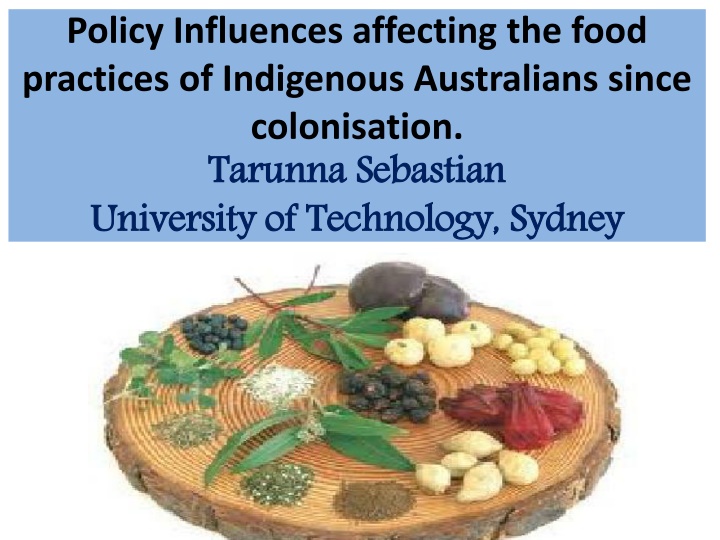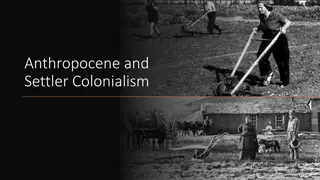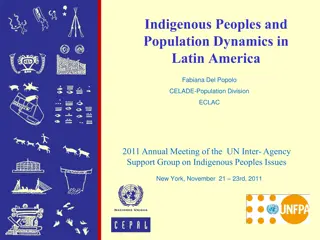Policy Influences on Indigenous Australian Food Practices Since Colonisation
Indigenous Australians' food practices have been influenced by various policies since colonisation, leading to health challenges and a life expectancy gap. Factors such as historical, cultural, and social structures have shaped dietary habits, impacting the overall well-being of Aboriginal and Torres Strait Islander peoples.
Download Presentation

Please find below an Image/Link to download the presentation.
The content on the website is provided AS IS for your information and personal use only. It may not be sold, licensed, or shared on other websites without obtaining consent from the author.If you encounter any issues during the download, it is possible that the publisher has removed the file from their server.
You are allowed to download the files provided on this website for personal or commercial use, subject to the condition that they are used lawfully. All files are the property of their respective owners.
The content on the website is provided AS IS for your information and personal use only. It may not be sold, licensed, or shared on other websites without obtaining consent from the author.
E N D
Presentation Transcript
Policy Influences affecting the food practices of Indigenous Australians since colonisation. Tarunna Sebastian University of Technology, Sydney Tarunna Sebastian University of Technology, Sydney
Freedom from want of food, therefore, must mean making available for every citizen in every country sufficient of the right kind of food for health. If we are planning food for the people, no lower standard can be accepted. https://encrypted-tbn2.gstatic.com/images?q=tbn:ANd9GcSJb9Crb3cZhUlpcOTOuv1dYz5PgWSrWtph4bVxvGBo2WzoqPun Sir John Boyd (b.1880 d.1971) First Director General of the UN Food and Agricultural Organisation
Aboriginal Australians face a range of health challenges which can be linked to dietary- related factors. Dietary practices of Aboriginal Australians emerged from historical, cultural, social and political structures in place for over the past 200 years.
Life expectancy of Indigenous Australians The life expectancy gap between Aboriginal and non-Aboriginal people is a national concern. Life style conditions such as diabetes and life style risk factors affect Aboriginal and Torres Strait Islander adults and younger age groups
The poor health of Indigenous people around The poor health of Indigenous people around the globe is linked to the globe is linked to Poverty Malnutrition Low levels of educational attainment, and Poor access to programs of disease prevention.
Examination of each major policy epoch on Examination of each major policy epoch on food practices and identity food practices and identity Factors affecting Aboriginal Australians food practices during: Pre-colonial Colonial Protection and Assimilation periods.
Pre Pre- - Colonial Food and Eating Practice Colonial Food and Eating Practice : A study conducted in the 1970s of 200 nomadic Australian Aboriginal men described them as slimly built, sinewy featherweights (Elphinstone 1971 cited in Gracey 1996:198). People were depicted as fit and slim in paintings of first contact.
Policies of protection and its impact on Policies of protection and its impact on food practices food practices The colonial impact on Aboriginal peoples food practices still effect Aboriginal people s health. Traditional food practices were gradually replaced by rations Rations were used instead of wages in exchange for labour. Rations comprised of flour, sugar, tea and jam.
Policies of assimilation Communal feeding Official ration not able to sustain health Privatization of cooking and eating removing Aboriginal people from public sites of collective consumption (Morris, 1989)
[The] rationing relationship was an historic achievement which turned Aboriginal people into paupers and robbed them of their own knowledge about food, culture and agency (Rowse, 1998) Food was also withheld as punishment
Policies of assimilation Forced removal of children interrupted development intergenerational food practices and exposed children to institutional malnourishment
Industrialisation of food practices Industrialisation of food practices The industrialisation of food practices has brought about social and political change and with it changes to the diet of Aboriginal people.
Other factors affecting food practice: Urbanisation Loss of traditional food practices, Increasingly sedentary lifestyles, Access to transportation Changing socio-economic status Cooking technologies, Food storage facilities
Conclusion Current patterns of food consumption among Aboriginal people are linked to more than 200 years of colonial food policy. These approaches continue and are reflected in aspects of current food policy
Thankyou tarunna_sebastian@hotmail.com























